Farmers fear being 'wiped out' if any more diseases strike
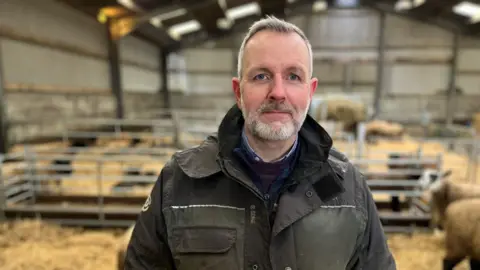 BBC
BBCA livestock farmer has lost more than half his newborn lambs in one of the first Scottish cases of a deadly virus - and fears he could be wiped out if his farm is struck by any more diseases.
The Schmallenberg virus killed up to 92 of the 152 lambs that Michael Goldie was expecting to deliver last month at his farm in Dundonald near Troon in Ayrshire.
Scotland had remained largely free of the Schmallenberg virus until January but concern is growing after a spike in cases.
The country's chief vet, Sheila Voas, says the disease is just one of an unusually high number of threats being faced by farmers.
She believes it is inevitable that other diseases will spread to Scotland and is urging farmers to be extra vigilant for warning signs.
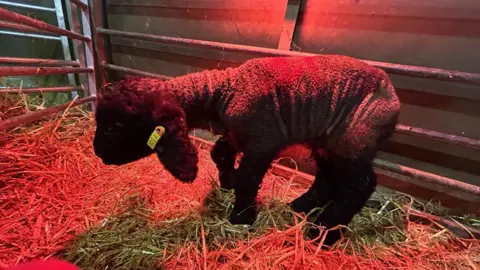 Michael Goldie
Michael GoldieMichael, 52, is a fifth generation farmer who breeds pedigree Suffolk sheep with the help of his mum Helen, who's 78.
The pair have been working together with the sheep since Micheal was 10 years old and the virus has left them both devastated.
He first realised he had a problem on the second day of lambing at the beginning of January.
They called in the vet when they realised some lambs "didn't look right", after which Michael said "it went bang".
The financial losses run into tens of thousands of pounds - but he says the emotional toll it's taken on the whole family has been much worse.
"You're looking at your dreams in front of you effectively just being shattered," he said.
"If I can get absolutely hammered by Schmallenberg, I could be wiped out by a different vector-borne disease."
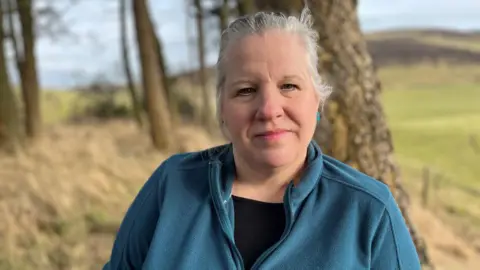
A range of diseases are causing concern for farmers at the moment.
The Schmallenberg virus was first detected in Germany in 2011.
Scotland's Rural College (SRUC) has confirmed five new cases so far this year - but because it's not a notifiable disease, it is thought there could already be dozens more.
A new strain of the bluetongue virus - which originated in the Netherlands - was detected in England in 2023.
More than 200 cases have now been recorded, with movement restrictions in place along the east of the country stretching from Sussex to North Yorkshire.
Both viruses are carried by midges which can be blown in the wind, and the changing climate means Scotland is becoming more exposed to diseases previously reserved to warmer areas.
Unlike Schmallenberg, Bluetongue can kill adult animals and have a more devastating effect on livestock.
Scotland's chief vet, Sheila Voas, has urged farmers to remain alert to the threats and submit suspected cases for testing.
She said: "There are a whole number of diseases there that are causing grief and it's a difficult time to be a farmer.
"There have always been health-related issues but it does feel like we've got more than is reasonable at the moment."
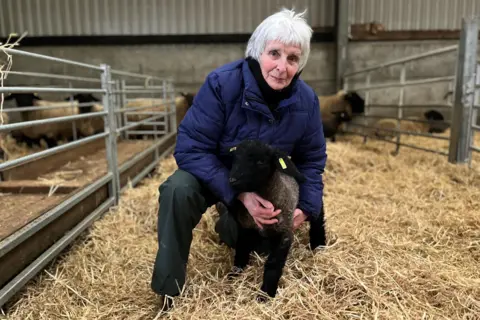
In January, an avian flu protection zone was declared for the whole of Scotland following a confirmed case in a backyard flock in Angus.
But its presence is causing significant concern to poultry farmers and the next risk comes in the spring when infected flocks of pink footed geese pass through Scotland as they migrate north.
The protection zone requires enhanced biosecurity measures to be undertaken by keepers although there is no requirement yet for birds to be kept indoors.
Containment of birds can accelerate transmission where the virus is present, which means housing them in sheds is not always the safest option.
Cases of liver fluke, which is transmitted through mud snails, have been rising over the long term.
It can result in the sudden deaths of previously healthy animals including sheep and cattle.
An isolated case of classical BSE - or mad cow disease - was discovered on a farm in Dumfries and Galloway in May.
Dozens of animals were subsequently culled, although no further cases were picked up.
And a single case of foot and mouth disease in Germany led to restrictions on products being imported.
It's understood the source of the case has still not been established.
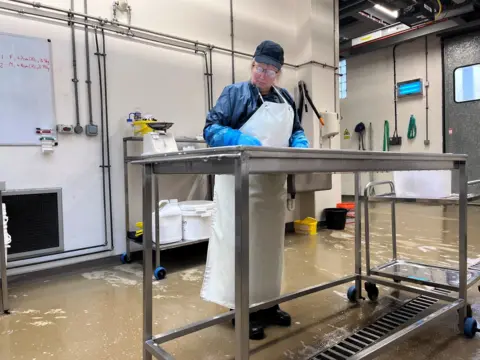
Experts at Scotland's rural college have been developing an app to help farmers improve the efficiency of their monitoring of animal health.
HerdPlan replaces paper-based surveillance and allows farm staff, vets and nutritionists to track and monitor vaccination strategies and infectious disease protocols across a range of areas in real time.
Its aim is to help farmers test regularly and spot potential problems at an early enough stage to contain them.
Vets are also available to carry out heavily subsidised post-mortem examinations on animals to establish what caused them to die.
SRUC says it carried out about 1,400 post-mortems in 2024 and is expecting that number to increase this year.
Head of veterinary surveillance at SRUC, Dr Pamela Johnston, said post-mortem testing was "absolutely key" to understanding the transmission of diseases.
She added: "If you think back to the foot and mouth epidemics that we've had, [they can be] disastrous. Not only financially but emotionally.
"It's horrific for the farmers to deal with."
Michael Goldie's flock is now showing signs of antibodies which, he hopes, will protect them from a repeat of the Schmallenberg virus.
The chief vet though says it's "probably inevitable" that Bluetongue will reach Scotland at some stage, maybe even this year.
And so farmers like Michael are being urged to be extra vigilant for the signs of that and other diseases that may be coming.
